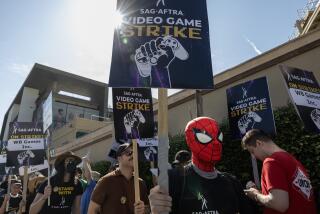Cliffhanger
The contract between Hollywood studios and the largest actors union, the Screen Actors Guild, expires at midnight, but donât hold your breath for a last-minute deal. Rather than bargaining feverishly to end an impasse that has already idled thousands of workers, negotiators have been biding their time until July 8. Thatâs when the smaller actors union, the American Federation of Television and Radio Artists, finishes voting on the tentative contract its board overwhelmingly approved this month. SAGâs leaders are focused on persuading AFTRA to reject the contract, arguing that it would enable actors to extract better terms from the studios.
Thatâs the hypothesis, at least, but it seems wildly optimistic. The AFTRA deal follows the pattern set by this yearâs contracts between the studios and the directorsâ and writersâ guilds. Supporters say its core financial provisions are the best that could be expected in the current economy. It falls short mainly in comparison to the promises SAG leaders made to the rank and file, such as obtaining higher residuals on DVDs and requiring residual payments for any video reused online. Even if they managed to kill the AFTRA agreement, SAGâs leaders would still have to persuade the studios to make concessions that the writers couldnât win after a 100-day strike -- a hiatus that cost many writers more in lost pay than they gained from the eventual deal. No matter how much leverage it has on July 9, SAG is unlikely to break the pattern established by the previous deals without putting everyone who works in and around the industry through considerably more pain.
Yet SAG isnât the only party that needs to move to end the impasse. The guildâs lead negotiator complained last week that the studiosâ proposal was worth millions of dollars less than the deal they extended to AFTRA. Clearly, the studios werenât putting their best offer on the table despite the lateness of the hour. More important, they need to acknowledge that SAGâs demands grow out of legitimate complaints about the way studios have treated the talent unions. The residuals for home video, which started low when the technologies were new and were never increased, make SAG suspect the studiosâ willingness to share any new revenue stream fairly. The union is understandably nervous too that the studios will try to shortchange its members as they do more online. And the squeeze felt by middle-class actors reflects the increasing percentage of film and TV budgets that the studios pay to stars.
Still, the guildâs negotiations have to accept, as actor George Clooney put it, the âfundamental factsâ of the bargaining situation today. That means focusing on the unique needs of actors, rather than seeking changes that would ripple back through the deals already struck. Thereâs plenty for the two sides to negotiate on that front, including new rules for excerpts and payments during work stoppages. Thereâs just not a lot of time.
More to Read
The biggest entertainment stories
Get our big stories about Hollywood, film, television, music, arts, culture and more right in your inbox as soon as they publish.
You may occasionally receive promotional content from the Los Angeles Times.










